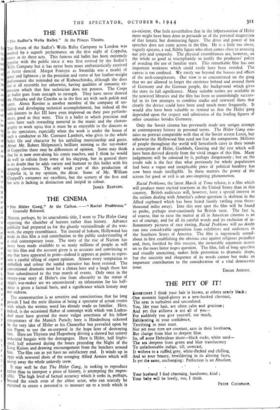THE CINEMA "The Hitler Gang." At the Carlton. — " Racial Problems."
Generally Released.
MISLED, perhaps, by its unacademic title, I went to The Hitler Gang expecting the chamber of horrors rather than history. Advance publicity had prepared us for the ghastly verisimilitude of the wax- work, the empty resemblance. Yet instead of hokum, Hollywood has made in this film a real contribution to the public understanding of a vital contemporary issue. The story of the rise of Nazism has never been made available to so many millions of people as will see this film and the account given is as accurate and convincing as any that have appeared in print—indeed it appears at points to repre- sent a careful sifting of expert opinion. Almost every temptation to embellish and colour the sordid narrative has been resisted. The conventional dramatic need for a climax here and a laugh there has been subordinated to the true march of events. Only once in the twenty-year story of Hitler's rise from obscurity to the status of 1939's war-maker are we unconvinced: an infatuation for his half- niece is given a factual basis, and a significance which history may not endorse.
The reconstruction is so sensitive and conscientious that for long periods I had the eerie illusion of being a spectator of actual events with which the written word has already made us familiar. Here, indeed, is the occasional flicker of contempt with which von Luden- dorf must have greeted the more vulgar assertions of his fellow conspirators of the Munich Putsch; here is Hindenburg sickened by the very idea of Hitler as his Chancellor but prevailed upon by von Papen to use the ex-corporal in the hope later of destroying him. Here are Thyssen and Hugenberg driving a shrewd but uneasy industrial bargain with the demagogue. Here is Hitler, half fright- ened, half ashamed during the hours preceding the Night of the Long Knives and drawing encouragement from the butchers around him. The film can as yet .have no satisfactory end. It winds up in 1939 with newsreel shots of the avenging Allied Armies which will sweep away the whole unlovely crew.
It may well be that The Hitler Gang, in seeking to reproduce rather than to interpret a piece of history, is attempting the impos- sible. The high level of factual accuracy which it seeks is, perhaps, beyond the reach even of the ablest actor, who can scarcely be expected to create a personal:tv to measure up to a truth which is
co-existent. One feels nevertheless that in the imVersonation of Hitler more might have been done to persuade us of the personal magnetism of that lunatic but dominating figure. The drive and power of his speeches does not come across in the film. He is a little too obese, vaguely epicene, a sad, flabby figure who often comes close to arousing our pity and sympathy. The physical resemblances are, however, on the whole so good as triumphantly to justify the producers' policy of avoiding the use of familiar stars. This remarkable film has one important weakness which could easily have been avoided. The canvas is too confined. We rarely see beyond the houses and offices of the arch-conspirators. Our view is so concentrated on the gang that we are allowed to forget the existence behind and around them of Germany and the German people, the background which gives the story its full significance. Many suitable scenes are available in the newsreel libraries and the film has been so astonishingly success- ful in its few attempts to combine studio and newsreel shots that clearly the device could have been used much more frequently. It would also have been valuable to remind us that the Hitler gang depended upon the respect and admiration of the leading figures of other countries besides Germany.
Only the Soviet cinema has previously made any scrirs attempt at contemporary history in personal terms. The Hitler Gang con- tains no portrait comparable with that of the Soviet screen Lenin, but otherwise the Hollywood film need not fear the comparison. Millions of people throughout the world will henceforth carry in their minds a conception of Hitler, Goebbels, Goering and the rest which will have been derived directly from the vivid images of this film. Many judgements will be coloured by it, perhaps dangerously ; but on the credit side is the fact that what previously for whole populations had been a vague and inexplicable piece of political banditry has now been made intelligible. In these matters the power of the screen for good or evil is an awe-inspiring phenomenon.
Racial Problems, the latest March of Time release, is a film which will produce more excited reactions in the United States than in this country. British audiences will, however, have a special interest in the section dealing with America's colour question (a skeleton in the Allied cupboard which has been heard faintly rattling even three- thousand miles away). Into this sore spot the film will be found to probe, perhaps over-cautiously for British taste. The fact is, of course, that to raise the matter at all in American cinemas is an act of courage, and for all its careful words and its exclusion of in- flammatory pictures of race rioting, Racial Problems will no doubt run into considerable opposition from exhibitors and audiences in the Southern States of America. The film is ingeniously round- about in first establishing the obvious case against religious prejudice and, then, fortified by this success, the inexorable argument moves on to the more bitter negro question. The film, full of long speeches and visually unexciting, makes little pretention to dramatic shape, but the sincerity and eloquence of its words cannot but make an important contribution to the consideration of a vital democratic issue.
EDGAR ANSTEY.


























 Previous page
Previous page